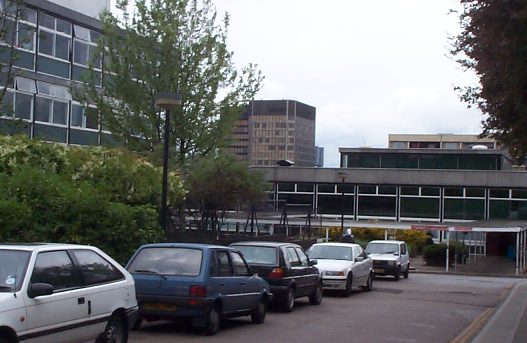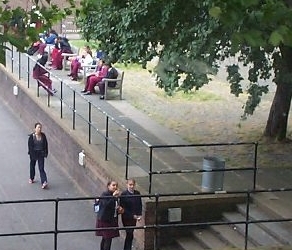Career interview: Secondary maths teaching
Paul Clifford is the Deputy Head of Maths at Elizabeth Garrett Anderson school in Islington. The Plus team visited him there to hear about life as a secondary maths teacher.

Paul Clifford
Early background
Paul went to Roundhill Primary School in Beeston, just outside of Nottingham, and followed on to Bramcote Hills Grammar School (now a Comprehensive). "I enjoyed school", he said. "I was academic rather than sporty. I was reasonably successful up to O-Levels, but I really took off at A-Level because I did nothing but maths - maths, further maths and physics. It felt like doing the same A-Level three times! I have a lot of respect for people who take diverse A-Levels."
Paul said his father inspired his initial interest in maths. "He left school at 13 - he didn't have much schooling and was self-conscious about this, but he had a good brain. I used to do puzzles with him for fun. He was a very good puzzle solver." Paul was also inspired by Martin Gardner's "Mathematical Recreations" column in Scientific American magazine. "I was an amateur conjuror, and so was Martin Gardner", said Paul, "so we had something else in common."
Tertiary experiences
After school, Paul went to Oxford University to take a maths degree. He enjoyed his time there, but feels he could have enjoyed it more. "I was a bit green", he said. "I would have made more of it if I'd gone there three years later. I was a swotty A-Level student - a successful student, but not a successful teenager! I got better at Uni, but I was still lagging a bit." He said he was initially a bit intimidated by Oxford. "I expected to be out of my depth, but I wasn't. I worked hard in the first year, but after that I slacked off! I regret not doing as well as I could have. I worked so hard at A-Level that I think I lost some enthusiasm."
In hindsight, Paul feels that perhaps he took the wrong subjects at University. "At school, I took an SMP A-Level with vectors and mechanics. I found algebra difficult back then, so I chose the applied route at Oxford - an easier option, because it involved things that I was good at. I'm not sure I found it satisfying. I'd choose number theory now." Of course, Paul didn't only study at Oxford. "I also played squash and backgammon, and I was a keen card player. I was also in the conjuring society. Most of the time, though, I was basically social - with a group of friends in the Buttery, or the pub. I could have got more out of all the things that were going on."
When he started his degree, Paul didn't have a clear idea of where he wanted to end up. "I'd thought about teaching", he said. "I had two very good A-Level teachers and I respected them a lot. I also did some coaching of other students during A-Levels, which I enjoyed. At University, I was scared that if I became a teacher I'd be eaten alive - I was quite a shy undergraduate. I went to the careers advice service and they agreed that teaching might be an option to consider later."
The world of work
Instead of going directly into teaching, Paul decided to look for a research position in industry. He interviewed with a number of companies, including Rolls Royce, British Rail and British Aerospace Industries, and eventually chose a research position with the Atomic Energy Authority in Winfrith, Dorset. "Rolls Royce offered me an Engineering apprenticeship, but I chose the Atomic Energy Authority because I could be a mathematician there", Paul explained.
Unfortunately, the job didn't suit Paul very well. "I was working on groundwater modelling - predicting how water flowed, and how the material in it flowed. The geology model was very complicated, with lots of detail, and the modelling used complicated finite difference code. The job involved putting in data and playing with it, a lot of iterative experiments. I didn't enjoy the process. My heart wasn't in it. I felt I was being a scientist, not a mathematician - or not the kind of mathematician I wanted to be. Unfortunately there aren't many real problems that can be solved analytically!"
Despite this, Paul enjoyed his new life in Dorset. "It was an important time. I grew up after college, made friends that I still have, and enjoyed living away from home and University, being my own person. It was a beautiful part of the world. I'd go to the pool, play badminton. It was a good life - I just didn't enjoy the work!"
After three years at the AEA, Paul decided to follow his earlier impulse to go into teaching. "I had to get out of the AEA. I wasn't happy, or using my potential. I felt a vocational pull to teach through my good experiences at school. I also wanted to work more with people - I wanted a career involvement in maths, but something more people-oriented. Teaching contains them both. It's all about interaction, communication, building relationships."
Back to teaching
To make the move into teaching, Paul decided to take a Post-Graduate Certificate in Education (PGCE) at Homerton College, Cambridge. "It was the obvious way in," said Paul. "My sister was doing a B.Ed. at Homerton, and I'd visited her there. Cambridge is a beautiful city." Paul enjoyed his PGCE training. "It was a very good experience. I was much more socially active - I was the Postgraduate representative, and was involved a lot with other students through college committees, friends and my sister. I really enjoyed the course. Half of the course was on maths teaching, but I also enjoyed doing some educational sociology, psychology and philosophy. I'm pleased I did the training at a time when it was predominantly done at College. I only had one term of teaching practice, which was the most difficult part of the course! I didn't feel I really learned to teach until I started teaching. Nowadays it's much more schools-focussed."
After his training, Paul spent three years at Hackney Downs Boys' Comprehensive (now closed). "I applied to the teaching pool, wanting to come to North London. I wanted a multicultural environment, and a contrast from Dorset. The school needed a maths and science teacher. I didn't enjoy teaching science so much, and after a year switched to straight maths. It was hard work - a rumbustious school for somebody just starting to teach! Fortunately I enjoyed working with the boys, and got to teach some A-Level maths."
Globetrotting
After three years at Hackney Downs, Paul decided that he wanted to travel. "It was a difficult time in London anyway because of teacher cutbacks, so it felt a good time to get out". He spent two months in the US "on the usual backpack route, sleeping on Greyhound buses and so on", then went to New Zealand. In Auckland, he found a temporary teaching job for several months. "I lived with a one-parent family with kids and animals everywhere. I enjoyed it, and loved Auckland. It was a very happy time." After this, he spent nine months travelling in Australia.
Back in London

Elizabeth Garrett Anderson School, Islington - an inner urban school.
When he returned to the UK, Paul found a new position at Elizabeth Garrett Anderson School in Islington, where he still teaches eleven years later and is now Deputy Head of Maths. "It was initially a temporary position - I came in to replace another teacher - but it's a permanent job now. I like the school, the students and the staff."

Playground and students at Elizabeth Garrett Anderson School.
While continuing in his teaching job, Paul took an M.A. in Maths Education at the Institute of Education in Russell Square, and is now enrolled in a Ph.D. "but it's hard to find time!" He found the M.A. valuable - "I'm now involved in a lot of extra projects, and I was seconded for part of my M.A. as a researcher at the Institute of Education. I'm interested in the academic side of teaching."
The hardest thing about teaching, said Paul, is "political intervention". He's frustrated by changes that are "politically driven rather than thinking about best practice. I'm all for support for teachers, but I'm not in favour of interference. Political agendas make us angry - we wonder where it's all going."
Paul says the best thing about teaching is that it engages with his many interests. "I'm enthusiastic about maths - I love maths - and I like working with people. Teaching is a profession where you can make space for yourself to be creative. It's never boring. The time at school flies by! In an office, it might be less stressful and better paid, but I wouldn't be as interested. As a teacher, you can change people's lives when it goes well. That's rare, and valuable. I can't imagine many professions like that!"